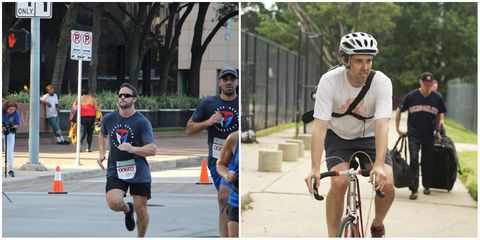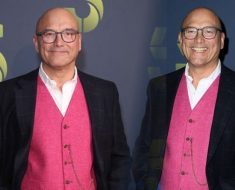
How much do we care about a political candidate’s health?
By Matthew Kassel
When Republican congressional candidate Dan Crenshaw, a former Navy SEAL who sports an eye patch, completed a five-day, 100-mile run through his district, which includes a sizable chunk of Houston, in February, he live-streamed it on Facebook. The run was intended to raise money for Hurricane Harvey relief. But that wasn’t the sole reason. Crenshaw, in his early 30s, was attempting to drum up publicity for his campaign, too. The actual physical effort helped: Regarded as an underdog, he vanquished his opponents in Texas’s spring primary.
Across the aisle, Beto O’Rourke, the 46-year-old Democratic congressman who is looking to unseat Texas senator Ted Cruz—and may actually have a chance of doing so—has adopted a similarly energetic strategy to build momentum on the stump. Rather than engage in sedentary town halls where the adrenaline level is low, O’Rourke, who runs an eight-minute mile, is jogging alongside his supporters as he makes his way through the Lone Star State corralling votes. Both men, with divergent political views, have taken the art of campaigning to its extreme: They are literally running for office.
The two Texan hopefuls are not unique in their unorthodox approaches. There’s an emerging trend in politics in which more candidates are using fitness and exercise to frame their messaging and connect with voters. Why? Maybe because Americans have become more health-conscious, for one, and many candidates want to meet their potential constituents wherever they can—be it in the gym or on the track. (Men’s Health, it’s worth noting, may also have played a small part here when in 2011 we featured the now-disgraced congressman Aaron Schock, and his six-pack, on our cover.)
Mostly, though, candidates who incorporate health and fitness into their images are attempting to convey that they have what it takes to withstand the public endurance test that is modern politicking. “It’s a subtle way of reminding people that we have the energy to do what we want to do,” says Andy Thomson, a 36-year-old fitness buff running for city council in Boca Raton, Florida. Perry Gershon, a 56-year-old congressional aspirant on Long Island, New York, echoes that sentiment, claiming the 21 marathons he’s completed have put him in a rarefied position. “I know I can be focused on a political race,” he explains, “because it’s the same kind of stamina.”
Not that every candidate needs to be as intensely fitness-focused as, say, Speaker of the House Paul Ryan, the 48-year-old Republican from Wisconsin who’s wooed his supporters not just with his attempts at budgetary wizardry but also with his punishing devotion to P90X.
According to campaign strategists, political advisors, communications specialists, and image consultants we spoke to, voters are more interested in seeing that candidates are at least making an effort to take care of themselves. Some of the most charismatic politicians have had vexed relationships with food and fitness, but they appealed to the majority of voters because their vulnerability made them appear more genuine. Consider Bill Clinton, an avid jogger who also loved McDonald’s and was no less popular for it. Barack Obama played basketball but struggled to kick his smoking habit. Former Arkansas governor Mike Huckabee lost more than 100 pounds and wrote a book about it. Chris Christie, not exactly an avatar of health or physicality as governor of New Jersey, nevertheless had energy, and when he got weight-loss surgery in 2013, he was cheered.
A bariatric procedure or a trophy case full of marathon medals doesn’t guarantee a successful campaign, however. “Just because you’re physically active or fit doesn’t mean voters will accept you,” says Joseph “Tex” Dozier, a partner at the political consulting firm JTD Strategies, which is based in Austin, Texas. “What matters is that your fitness or diet regimen humanizes you.” Male candidates who want to win voters’ hearts need not be decathlon winners (though it doesn’t hurt). They just need to appear well-rounded.
There is perhaps no more well-rounded man in American history than William Howard Taft; at more than 300 pounds, he was our heaviest president and the first to have dealt with weight as an image issue. Taft embarked on a public weight-loss program that presented him as a man who cared about his health, according to Deborah Levine, Ph.D., a medical historian at Providence College in Rhode Island. “I think of him as the first celebrity weight-loss patient,” she says. Plenty of presidents after Taft disguised their health issues. Franklin D. Roosevelt, a paraplegic, was rarely photographed in his wheelchair. John F. Kennedy hid his chronic back pain along with his Addison’s disease. Today, there’s more transparency and accountability around health and fitness—candidates release health reports to prove they’re in good shape, or at least sufficiently fit, and put any misgivings to rest.
Still, there’s something of a double standard in the way politicians are expected to make a go of being healthy while packing away cholesterol-heavy meals at local diners on the campaign trail. When Jeb Bush was running for president in the 2016 election, he was trying to maintain a paleo diet that had him turning down local food at every stop. The “diet comes first” moves made him appear standoffish, alienating him from regular Americans.
The same thing can happen when it comes to the kind of exercise candidates engage in, according to Phil Singer, founder of Marathon Strategies, a communications and research firm. In 2004, John Kerry was photographed windsurfing and criticized for being an elitist, out of touch with the common American experience.
Not all sports are created equal in the American eye, though that may be changing. A decade ago, a candidate touting his devotion to yoga might have been seen as out of touch too, but now candidates on both sides of the aisle do it—even if it isn’t as popular as it is, say, in the NFL—including Texas railroad commissioner Ryan Sitton, an avowed fitness freak, and Ohio congressman Tim Ryan, who says he plans to capture the “yoga vote” should he run for president in 2020.
The exercise that candidates choose to most associate with publicly depends, at least at the state level, on regional concerns, says William Mutch, a lobbyist in the Denver area who has worked on a number of political campaigns. Colorado governor John Hickenlooper, for example, enjoys cycling. Mike Ross, a former Arkansas congressman, was “a gym rat and a runner,” according to Duane Baughman, a political consultant based in California. “But because he was from Arkansas, his quiet place was hunting and fishing.”
Voters are attracted to those they can relate to, rather than those who seem distant, says Alexander Todorov, Ph.D., professor of psychology at Princeton University, who examined voter preferences in his book Face Value: The Irresistible Influence of First Impressions. “There’s a preference for candidates who resemble voters,” he says.
That’s one reason President Donald Trump was able to appeal to voters as a purported billionaire. When he ran for office, he was a 70-year-old fast-food glutton who didn’t—and still doesn’t—work out, but the energy he brought to his campaign was an extraordinary feat as he crisscrossed the nation attending one campaign rally after another like a pro athlete, though one fueled by KFC and TV instead of, you know, actual physical training.
There are candidates who do get attention for their physique or their perceived “manliness” alone, like Arnold Schwarzenegger, Jesse Ventura, and perhaps Bill Bradley. The pro wrestler Glenn Jacobs, known as Kane, was elected mayor of Knox County in Tennessee in August.
On the whole, they don’t need to prove they can bench-press their body weight, even as campaigns become more fitness- focused. What’s more important is that candidates show they have the mental, physical, and social acumen—the humanity—to weather the workout of politics itself. “Voters may not care if their candidate has a six-pack,” says Dozier. “But they definitely want to be able to drink one with you.” Probably after a jog.
Matthew Kassel has written for The New York Times Magazine and The Wall Street Journal.
Source: Read Full Article





